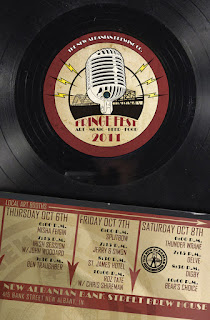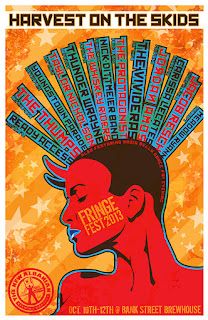It’s bizarre the way that memories can stay with us for decades, and then we awaken to find it's hard to recall what we had for lunch yesterday.
For instance, I still remember watching a very scary B&W horror flick when I was a little kid, so terrifying that it still resonates decades later.
In one of the pivotal scenes, a scientist is attacked in a cave by his own mutant creation, a gigantic monstrous blood-sucking vampire spider, which drains the man of all his bodily fluids, leaving him shriveled and bleached out, pasty pale, suitable for nothing except empty calories for the carrion flies.
But let’s not dwell on Mike Pence’s deathly pallor in his debate with Kamala Harris on Wednesday.
I hear the fly wants his money back: "Where's the beef?"
---
And so finally the election draws near.
Don’t worry.
I’m not about to climb down from the dizzying heights of the hill upon which I am fully prepared to
drink (to
die? Seriously? I wouldn’t consider DYING for these amoral, greedy schmucks – and that’s just the NFL owners), this looming height being my deep, pervasive and abiding disgust with America’s fraudulent two-party political duopoly.
As a genuine social democrat trapped in an anti-intellectual milieu filled with progressive poseurs who can’t muster the chutzpah to contest the dimwits on the other side, my hostility to the Democratic Party peaked in early March, when the capitulating centrists pulled every last string, called in all the necessary markers, and vanquished the party’s left wing.
Had I chosen, I might have devoted this column’s weekly inches ever since April to the myriad failures of the Democrats, beginning with our vacuous local party elites here in the New Albanian swampland, then scaling the slimy pole of unprincipled aff/inf/luence until the Democratic National Committee itself came into view, at which point I would be compelled to excuse myself, step away from the laptop, and slip into a Hazmat suit.
Of course, as damning as the indictments capable of being made against the Democrats, the Republicans have devolved spectacularly from merely objectionable into a drain-circling death cult, of which I’ll have more to say in a moment.
In the sense of our hallowed two-party system of spoils, irrespective of which “side” one chooses to inhabit (to squat?), politics today is a dismal, depressing and depraved journey into the very dark heart of human dysfunction.
By extension, this same old song and dance in American idiocy would have remained roughly the same as always in 2020 if not for the emergence of the COVID-19 virus and the pandemic that followed. Literally for once in our lives, there was a new twist in the tale.
One “side” is failing this test far more spectacularly than the other, and they're the ones I'll be voting against.
---
We’ve observed previously that the COVID-19 virus opportunistically targets vulnerable human physiologies. But the extent to which it has done precisely the same in terms of weakened human psychologies and belief systems simply cannot be underestimated.
We’ve seen already thin remaining layers of civility and sensibility stripped away. The science deniers have “enchantingly” multiplied not unlike Pence’s spider-victim-fly diet of pure excrement, waxing orgasmic as they’ve urged old folks to take one for the greater glory of the stock market. The owners of capital meanwhile have used the occasion to double down, while for the rest of us the economy seized up.
Then the deeper ugliness came forward, the accumulated bile, conspiratorial gibberish and raw hatred, much of it borne of generations-long cognitive dissonance, exploding from the ranks of the right-wing’s white know-nothings as Black Lives Matter demonstrations explicated the systemic persistence of racism and absence of social justice.
Through it all, numerous previous unaddressed crises – climate change, health care, income inequality, basic human rights – didn’t exactly disappear.
To be sure, not every Democrat got the pandemic response memo, and even a few Republicans quietly sidestepped their own party’s institutionalized inadequacies, but the primary outcome of the virus’s own truth-revealing capabilities has been the surgical exposure of the GOP’s fundamental(ist) fascination with dying for the “cause.”
And the cause itself? Someone else’s,
as it always has been. Mostly the “cause” of bigger money, with a jot or two of apocalyptic religion, wrapped in a flag, although it’s never clear with these retrograde fantasists whether they mean an American or a Confederate flag.
The Republican death cult is the inevitable outcome of five decades spent busily espousing and later gleefully implementing neoliberal, survival-of-the-fittest economic orthodoxy, as abetted by hypocritical end-times Christian theocrats, and washed down with enough white supremacist Kool-Aid to float a fleet of oil tankers.
We should hardly be surprised at this acceptance of death as inevitable. For years, conservatives have responded to gun violence with angry renunciations of any links to gun proliferation or lax gun control laws, offering instead “thoughts and prayers.” The one exception where Republicans express outrage is over the “death” of fetal cells inside women’s bodies—indicating that the fight is less about “murder,” as the anti-abortionists like to call it, than it is about controlling women’s bodies. By and large, the nation’s right-wing factions have for years wanted us to accept mass deaths and preventable mortality as a price for our “freedom.” They expect the same during a pandemic.
But the Republican death cult truly pole-vaulted over the tipping point, and left Democrats in the dust, when BLM became part of our daily discourse, illustrating that James Baldwin’s words ring more presciently than ever before:
When the Israelis pick up guns, or the Poles, or the Irish, or any white man in the world says “give me liberty, or give me death,” the entire white world applauds. When a black man says exactly the same thing, word for word, he is judged a criminal and treated like one and everything possible is done to make an example of this bad nigger so there won't be any more like him.
Structural racism, white fragility, white supremacy – all of it tied neatly together over a period of four centuries.
---
As malicious and looney-bin ludicrous as Donald Trump most surely remains on an everyday basis, allow me to remind you for perhaps the last time that he’s merely a symptom, and symbolic of the rotting disease within.
Trump’s a salesman with only one product, himself, and one true skill, which is enabling the truly dangerous fascists to worship him as an “answer” and purchase the snake oil.
Bullshit.
If it makes sense to you, as it does to me, that to be white is to be racist by nurture, and if whites as yet are the majority in America, if inexorably declining in terms of raw numbers compared to non-whites – and if whites overwhelmingly support Trump in 2020, as in 2016, then logically, Trump is the fruition of American history to the present time, not an aberration at all.
And, if American history since the Reagan era has been an exercise in unfettered capital accumulation by wealthy elites, enabled by neoliberal economic policies on BOTH sides of the duopoly’s aisles, but as always the very heart of the Republican Party’s preference for oligarchies and extractive, robber baron capitalism as its worst, then once again, Trump is a culmination of sorts.
Guns, money and Jesus; that a majority of white “Christians” find it expedient to indulge the worst demons of their nature with respect to racial and cultural distractions merely suggests that Abraham Lincoln’s conception of “better” angels was wishful thinking at best.
Trump’s siren call is for whites to reaffirm their superiority, the supremacist snowflakes having been shaken to the core by the Obama presidency. If lots and lots of us, up and down the spectrum, can make a blood sacrifice of death via COVID, that’s just icing on their cow pies.
---
Yes, I dislike the DNC, the Democratic Party’s hawkish warmongers, its centrist "liberal" cowardice, the neoliberal economic gutting, and the sheer volume of hypocrisy existing on the left side of the aisle.
Why, then, am I voting for Biden and Harris?
Because of the GOP’s death cult.
Because there comes a time when triage is paramount, and the bleeding must be stopped.
Because while there is no guarantee matters will improve with Biden, there is no chance of improvement with Trump, only further degradation.
Electing Biden and the Democrats won't resolve the fundamental problem of why 60+ million Americans have alchemized a narcissistic con man into a deity, and come together to fluff his personality cult.
(The short answer involves racism/caste, a misplaced sense of powerlessness, and no more comprehensive an education than an ordinary house fly.) It will, however, remove at least one blithering buffoon from the daily news cycle, so maybe...just maybe...we can convince 10% of the 60 million that the issues go far beyond the charlatan-in-chief, who is little more than a figurehead for self-deception.
Personally, up ticket, it will be all Democrats for me. Locally, in spite of the GOP’s ethical chasm, a precious few Republicans will nonetheless receive my vote. One is an incumbent who’s right for the job. Another is a protest vote against the prevailing NAHS student council
nepotocracy.
The third is Greg Roution, a man I've never once met. He’s a Republican running for coroner against Anthony Oxendine, a funereal circus-master who once tried to sneak a crematorium through the back door into my neighborhood and became all doofus petulant when his bluff was called.
That's all, folks. Go out and vote, vote against the death cult's vulgarians, and don't forget:













































